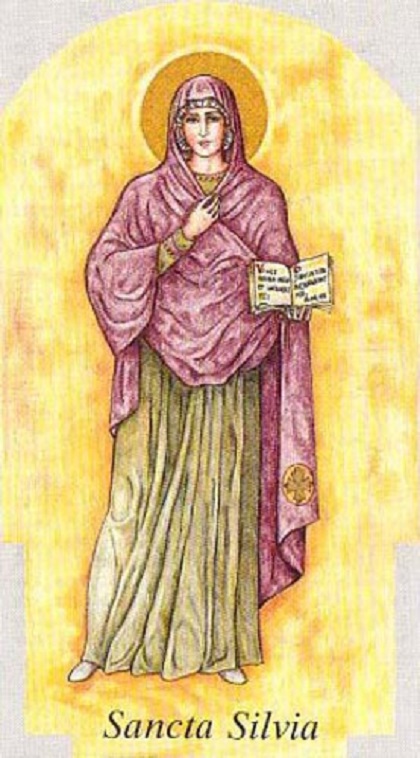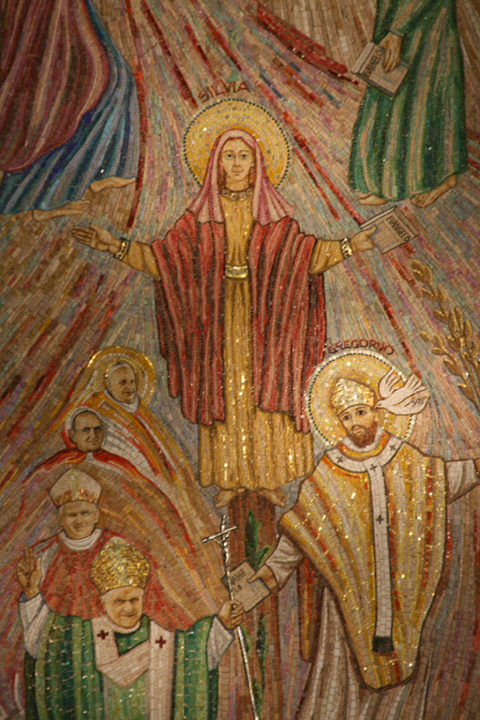Sainte Sylvie
Mère de Saint Grégoire le Grand (✝ v. 590)
Sylvette ou Sylvaine. Grande dame romaine qui consacra sa vie à son fils, le pape Grégoire le Grand, si attentive qu'elle se préoccupait même jusqu'aux détails des menus de ses repas en achetant à son intention les meilleurs fruits et légumes frais sur les marchés romains, afin qu'il soit en bonne santé.
Elle figure au martyrologe romain au 3 Novembre:
mère du pape saint Grégoire le Grand. Celui-ci rapporte lui-même, dans ses écrits, qu’elle atteignit le sommet de la prière et de la pénitence et qu’elle fut un exemple excellent pour les autres. Elle mourut vers 590.
Martyrologe romain
SOURCE : http://nominis.cef.fr/contenus/saint/8/Sainte-Sylvie.html
Chrétienne de Rome au VIe siècle, Sylvie eut l'honneur d'être la mère du Pape saint Grégoire le Grand ! Devenu Pape, Grégoire fit peindre le portrait de sa mère Sylvie et de son père Gordianus, dans leur maison familiale transformée par lui en monastère. Le Pape Grégoire n'avait pas une très bonne santé et se surmenait à la tâche ! Sa mère veillait donc sur lui avec beaucoup d'attentions. Cuisinière "biologique" avant l'heure, Sylvie se méfiait des légumes vendus au marché de Rome. C'est pourquoi elle faisait porter régulièrement à son fils le Pape, des produits de son propre jardin situé sur la colline de ,l'Aventin comme l'atteste encore de nos jours une inscription près de l'église Saint-André de Rome. Sainte Sylvie termina sa vie à Rome vers 592.
La fête de sainte Sylvie, mère attentive du Pape Grégoire le Grand, est l'occasion de souhaiter de tout coeur bonne fête à toutes les Mères de prêtres et à toutes ces femmes de grand dévouement dont la mission aujourd'hui est si importante dans la vie ecclésiale et paroissiale : les Aides au prêtre, laïques et religieuses. Elles ne sont pas que d'excellents "cordons bleus", comme Sylvie de Rome. Bien des curés et des recteurs de paroisses pourraient attester, comme l'un d'entre eux : "C'est plus et mieux qu'un vicaire !".
Rédacteur: Frère Bernard Pineau, OP
Sylvia of Rome, Widow (RM)
(also known as Silvia)
Died c. 572. Like all expectant mothers heavy with child--Sylvia was expecting the great event, greater than a hurricane or a revolution, the supreme phenomenon, the most extraordinary, historical, magical, wonderful, fundamental event--great by the miracle of man and great by the grace of God. For what do we know about Saint Sylvia? That she was the mother of Gregory the Great, pope and doctor of the Church.
Aren't we to a great extent what our ancestors have made us, a reincarnation (so to speak) of their flesh, a reflection of their thought? How often have I felt the throb of some distant echo, some call from ancient times, or sensed deep in the marrow of my bones the naked footstep of some Celtic ancestor or the raucous cry of a Mongol horseman, or glimpsed the furtive shadow of some pagan or primatial ancestor, as if my whole life were made up of fragments of lives that were lived thousands of years ago.
A man is what he brings into the world. Racine? The author of Andromaque. Silvia? The mother of Saint Gregory.
What sudden emotion to feel everything germinating, everything connecting with the vast and mysterious workings of the universe! Yesterday still only a girl, but from now on a leading character on the stage of life. Yesterday young and charming love, sweet nothings, carefree days, and then suddenly "crossing the line" and entering another world--something unknown, like a bird from strange islands, like the flutter of a palm tree in the desert, a whole new feeling of life, a mysterious dance, a new wine . . . a quickening in the womb, a son in the flesh.
To bear a child . . . as God bears mankind. In her womb and in her mind, Sylvia feels responsible for her child. Her mission is not just to give birth to the child but to compose the whole life of the man: his body and soul, she will devote herself completely to him--for if the mother gives birth to the body, does she not also wish to influence the soul? She dreams about him while giving him her breast, she shapes him, she gives him form with all the "desires" of her body and all the charms of her soul."
And so for nine months Sylvia waited and planned.
The child was to be a boy, no doubt about that--though she cherished her whole family, it was the son that stood out. She's already seen him: a vision, a positive, creative vision. Will he be a senator, like his father Gordian, a consul, the emperor? Will he be pope? A saint? There is no limit to the imagination of a mother.
Now all this took place in Rome in AD 540. Vigilius was pope and Vetegis was emperor--but who knows anything about them? It was a world still in transition. On one side were the invasions, on the other were the heresies. The child did brilliantly in his studies. He received a fine Latin education that would serve to rule men and defend dogmas. Already she saw him wearing the tri-colored toga of a Roman praetor.
But of what importance is the toga of man when compared with the robe of God? Suddenly Gregory divested himself of all his responsibilities and wealth and became a monk. The six villas that he owned in Sicily he turned into six monasteries. He was 35. And Sylvia felt in her body that the whole delicate structure of history was trembling.
There was a plague and the pope died. Sylvia decided that the next pope was to be Gregory. In vain did he refuse, escape from Rome in a wicker basket, hide in the forests and Pontine marshes. In the end of course he was found--or betrayed--and with great rejoicing brought back to the fold, where on Sept. 3, 590, he was consecrated pope. Gregory was pope, and Sylvia had been his prophet. "I have lost all the pleasures of peace," he murmured.
It was to be an heroic pontificate. The Lombards, who were devastating Italy, had to be checked. The emperor in Constantinople had to be confronted. Gregory wrote several works (particularly the Morals), reformed the Church, brought the Arian Visigoths back to the true faith, and evangelized England.
It was he who invented the phrase: Servant of the servants of God. His most characteristic victory was to stamp out the heresy of Eutyches, the patriarch of Constantinople, who maintained that the resurrection of the body would take place in a subtle form, in an ethereal flesh. Gregory replied that we will be resurrected in flesh and blood, as literally palpable as was the body of Christ to Saint Thomas.
"I shall be clothed again with my flesh," says the Book of Job, and at the Last Supper Jesus said: "This is my Body." One of the most moving aspects of the Catholic faith is the dominion of the body, semi-incorruptible and eternal.
By the time Gregory became pope, Sylvia had already entered a convent and her husband had become a priest--simultaneously, like twins. It was a time when Christianity was flourishing and it was the fashionable thing to do. But Sylvia's role had been consummated. The mother blended, merged, and rejoiced with the son (from the Encyclopedia).
Over her former house on the Coelian Hill in Rome a chapel was built in her honor (Benedictines).

